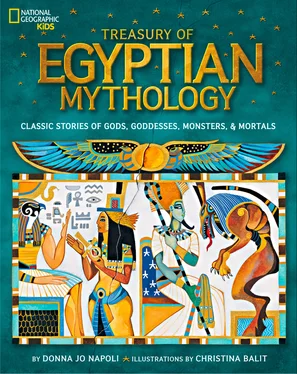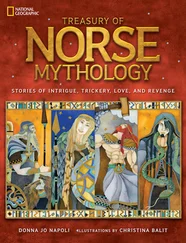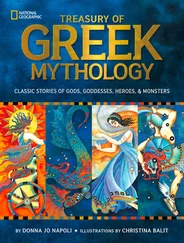Christina Balit - Treasury of Egyptian Mythology - Classic Stories of Gods, Goddesses, Monsters & Mortals
Здесь есть возможность читать онлайн «Christina Balit - Treasury of Egyptian Mythology - Classic Stories of Gods, Goddesses, Monsters & Mortals» — ознакомительный отрывок электронной книги совершенно бесплатно, а после прочтения отрывка купить полную версию. В некоторых случаях можно слушать аудио, скачать через торрент в формате fb2 и присутствует краткое содержание. Жанр: unrecognised, на английском языке. Описание произведения, (предисловие) а так же отзывы посетителей доступны на портале библиотеки ЛибКат.
- Название:Treasury of Egyptian Mythology: Classic Stories of Gods, Goddesses, Monsters & Mortals
- Автор:
- Жанр:
- Год:неизвестен
- ISBN:нет данных
- Рейтинг книги:3 / 5. Голосов: 1
-
Избранное:Добавить в избранное
- Отзывы:
-
Ваша оценка:
- 60
- 1
- 2
- 3
- 4
- 5
Treasury of Egyptian Mythology: Classic Stories of Gods, Goddesses, Monsters & Mortals: краткое содержание, описание и аннотация
Предлагаем к чтению аннотацию, описание, краткое содержание или предисловие (зависит от того, что написал сам автор книги «Treasury of Egyptian Mythology: Classic Stories of Gods, Goddesses, Monsters & Mortals»). Если вы не нашли необходимую информацию о книге — напишите в комментариях, мы постараемся отыскать её.
Treasury of Egyptian Mythology: Classic Stories of Gods, Goddesses, Monsters & Mortals — читать онлайн ознакомительный отрывок
Ниже представлен текст книги, разбитый по страницам. Система сохранения места последней прочитанной страницы, позволяет с удобством читать онлайн бесплатно книгу «Treasury of Egyptian Mythology: Classic Stories of Gods, Goddesses, Monsters & Mortals», без необходимости каждый раз заново искать на чём Вы остановились. Поставьте закладку, и сможете в любой момент перейти на страницу, на которой закончили чтение.
Интервал:
Закладка:
For the names in this book, I chose to use the older Egyptian names, not filtered through Greek: hence Tehuti. Nevertheless, I call the country “Egypt” instead of the hardly known ancient name Kemet. And since the Greek names are more familiar, I provide a reference chart below and list the gods’ and goddesses’ names both ways in the Table of Contents and on the opening pages of each chapter.
| Egyptian Name | Greek Name |
| Ra | Helios |
| Set | Seth |
| Aset | Isis |
| Usir | Osiris |
| Nebet Hut | Nephthys |
| Heru Sa Aset | Horus the Younger |
| Inpu | Anubis |
| Tefnut | Tphenis |
| Tehuti | Thoth |
| Heru Wer | Horus the Elder |
| Hut Heru | Hathor |
| Sekhmet | Sachmis |
| Nit | Neith |
| Khnum | Chnoumis |
| Sobek | Souchos |
| Bastet | Bast |
| Imhotep | Imuthes |
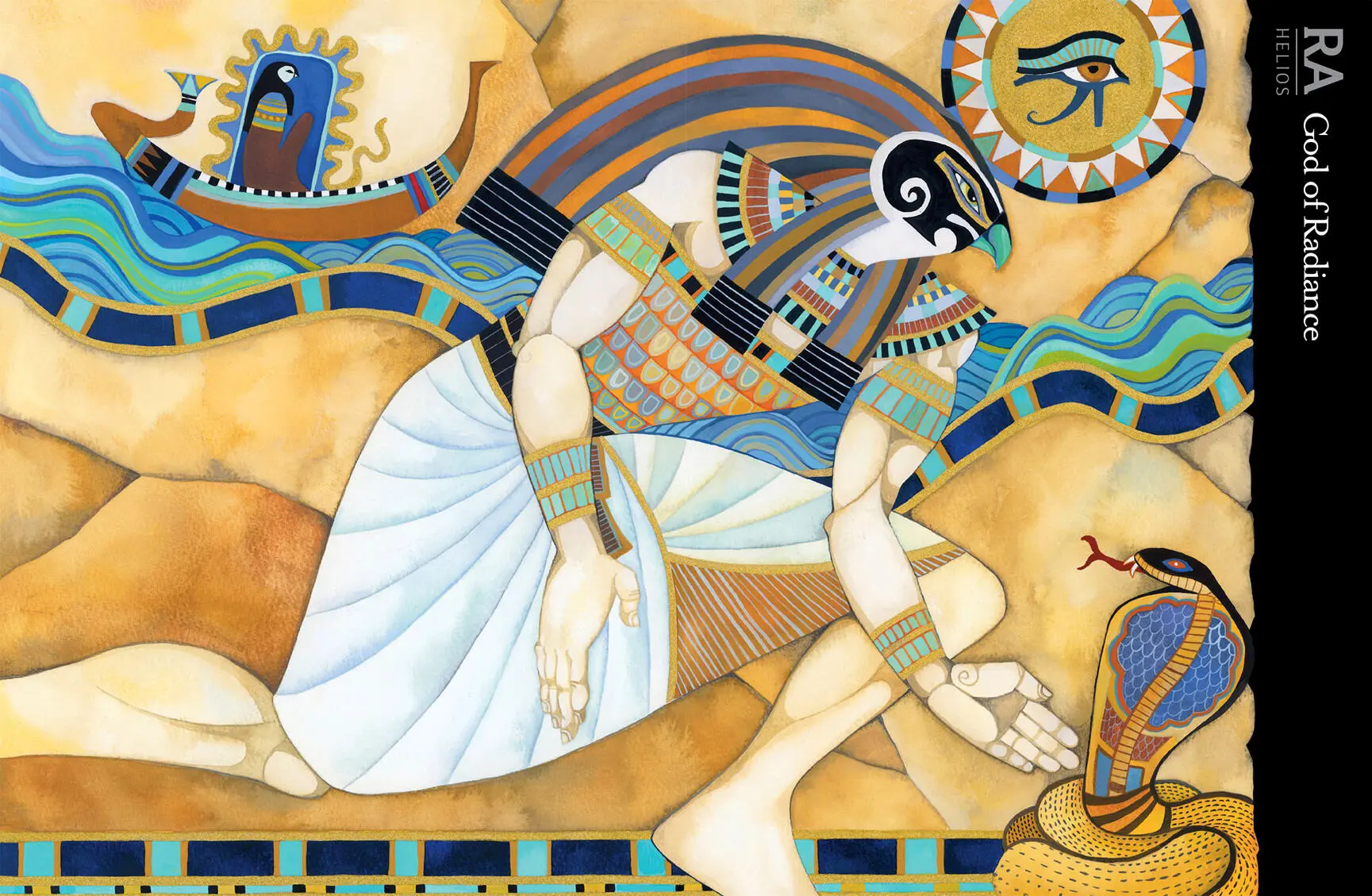
Ra: Ra’s first eye felt betrayed when Ra took a second. But Ra, ever resourceful, turned that old eye into a cobra and put her on the front of his crown, where she felt important again.

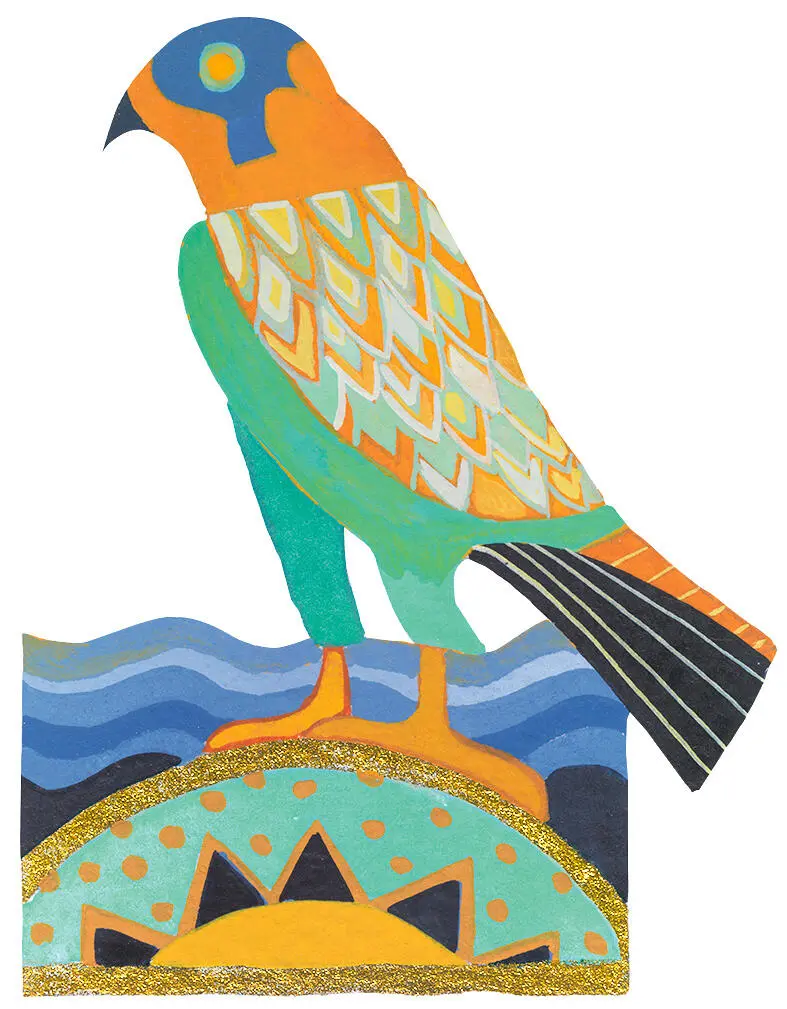
RA (HELIOS)
God of Radiance
In the beginning, before there was time,
water spread in every direction, though there was no direction really because there was no up, no down; no east, no west; no inside, no outside. This water lay cold and colorless. A wet nothingness that hummed nnnnnnnun. Nun, Nun. This was the cosmos, hardly more than empty chaos. There was but a single entity, so there was no question of order: The cosmos was ordered perforce. The order of a dot, a circle, a sphere, without beginning or end. Utter consistency. Perfect order.But something there is that doesn’t like order. Order can be tolerated temporarily, but on and on like that? Infinite order? How unutterably intolerable. Boring, really.
A hint came. A slight poke. Then another, a little firmer. A full-fledged beat now. More of them. Insistent beats, breaking up the hum, moving the water imperceptibly at first, then in tiny waves, then bigger ones, huge ones now, tsunamis, yet still in a pattern, still ordered, one after another at regular intervals. Thump thump thump thump.
A heart formed around this pulse, for every rhythm evokes an origin.
And in that heart nestled a thought. After all, some think with the head and others think with the heart. This was definitely a heart thought.
Ah, the first and the profound disorder: thought.
Language: The True OriginMost life-forms require
water. So it makes sense that Egyptian tales of creation involve a huge water mass. What is striking here, though, is the importance of words, reminiscent of the Bible’s Book of John: “In the beginning was the Word.” Today many scientists would argue that humanity really started with the development of language. Perhaps the ancients were focusing not so much on the creation of life as on the creation of humans.A strong ocean wave at sunset illustrates the majesty and power of water.
This single thought rubbed fast and faster until it warmed and finally ignited into language. The god Ra sprang to life with a word already in his mouth. More bubbled up. Words now crowded his mouth. They trampled his tongue and pushed against his teeth, his lips. He had so many words to enunciate. The need hammered at him. From that very need came lungs and a voice box and muscles to make it all move. Ra shouted the first word, over and over, and those shouts rose in molten mass up and up and spewed forth through the waters of Nun in a fiery explosion.
That was the first firmament, the mound of creation that Ra called benben—it all started with a single tip, like a volcano mouth. Ra stood upon it in triumph and knew he must speak more. For in his voice lay all creation. He must create, he must never stop creating.
Ra spat and the moisture from within him formed the goddess Tefnut, and the breathy force that propelled that moisture formed the god Shu. The products of his new mouth, his new lungs.
So there were three of them now, three deities distinct from the vast wallow of Nun. It felt wonderful to be a triad; it felt sturdy, invincible even. With three backs together, you could face everything at once. With three, you could explore the three dimensions simultaneously. Though there was no music yet, though there were no colors yet, Ra sensed the possibilities of three at some level he was not yet ready to understand.
But even more than the possibilities was the reality. Life mattered. And being a
father mattered. Ra rejoiced in his self- creation. He rejoiced in his creation of his daughter and son. This was a good beginning. Ah, what water had yielded. Ah, indeed.Shu and Tefnut, these royal
children, played constantly. They stalked each other and pounced and wrestled. They rolled around and swatted each other. Th ey were like lion cubs, and Ra was like a huge patient lion father, posing contentedly as they chased his tail or combed his mane, though of course there were no lions yet. There were only Shu and Tefnut and Ra, and the vast spreading Nun around the island the triad roamed.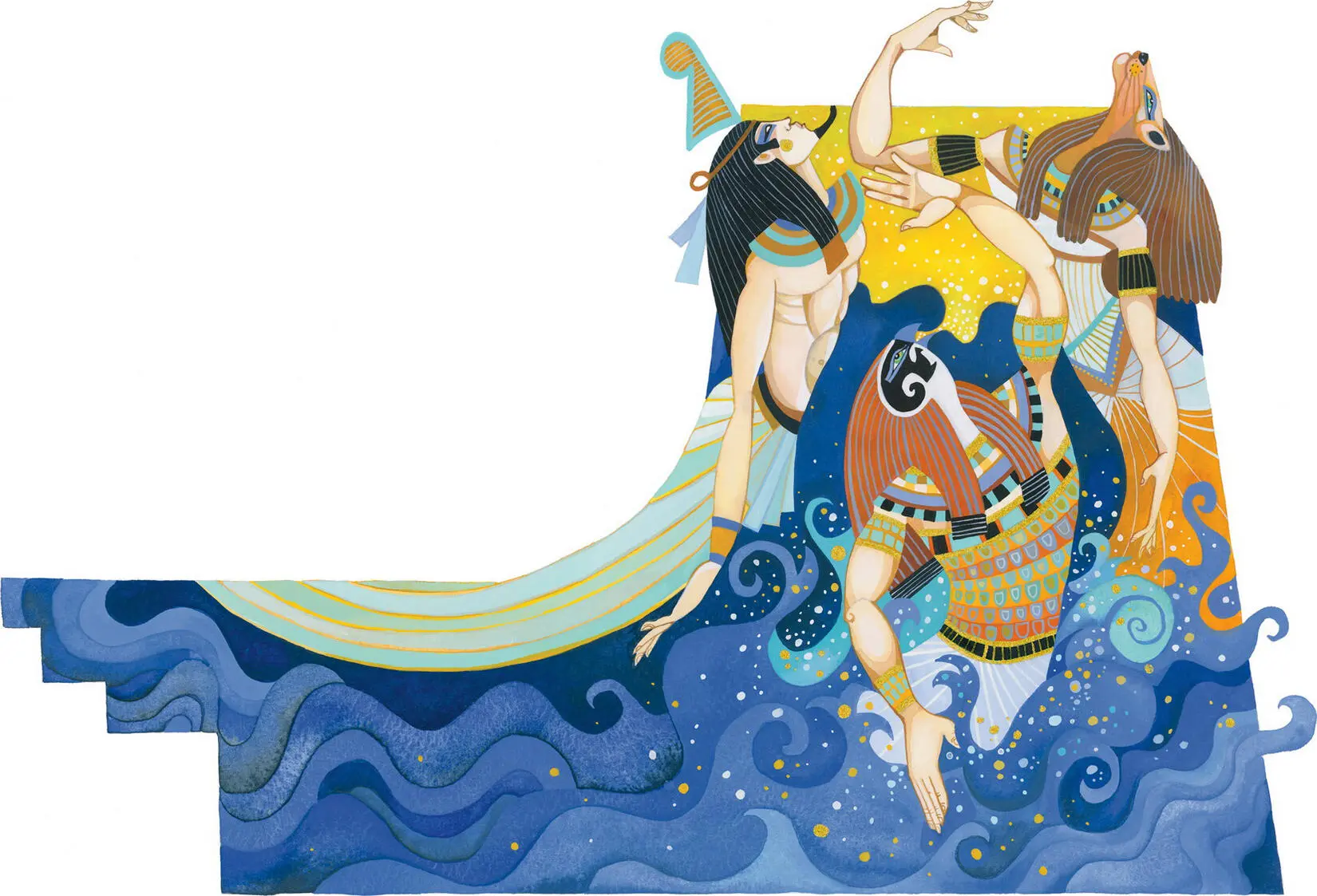
Ra, his spittle-born daughter Tefnut, and his breath-born son Shu, mingle as one and as three at the same time. They form the first of many triads among the Egyptian gods.
One night, instead of sleeping, Shu and Tefnut went off wandering in the dark. Shu was air and Tefnut was moisture and neither of them had special powers to let them see through the blackness. So, as
children will, they got lost.When Ra realized they were absent, he felt bereft. The difference between being alone in the vastness and being with his two children was the difference between sorrow and delight. He was lonely. And, worse, he grew anxious. There could be nothing out there to hurt the children, for, after all, there could be nothing out there period. What existed existed only because Ra had made it. Yet anxiety made this god itch all over until he wanted to scream and scratch his own skin off. He needed those children. He loved them.
At this time Ra had only one eye. He plucked it out from his forehead and sent his eye searching for Shu and Tefnut, for his darlings.
Then he settled down and waited for the eye to return. He waited and waited. While he waited, blind and cold, he curled in on himself and wondered what he would do if his eye didn’t find the children. It might search in vain forever. But the children could come back on their own anyway—that was possible. But that was terrible, too, for their father wouldn’t even be able to see them. Ra rolled in wretchedness.
And so Ra fashioned for himself a new eye, as he waited and waited some more.
Meanwhile the first eye of Ra, the original eye, lit up the world and flew across the firmament. It hugged the sands. It seeped into rock crevices. And now it soared across the waters, rising with each wave, falling as it crested. The old eye checked everywhere, everywhere and at last found the cowering cubs, who had grown all gangly and awkward, almost full size by now, and led them back to their father, dripping and skinny and needy.
Читать дальшеИнтервал:
Закладка:
Похожие книги на «Treasury of Egyptian Mythology: Classic Stories of Gods, Goddesses, Monsters & Mortals»
Представляем Вашему вниманию похожие книги на «Treasury of Egyptian Mythology: Classic Stories of Gods, Goddesses, Monsters & Mortals» списком для выбора. Мы отобрали схожую по названию и смыслу литературу в надежде предоставить читателям больше вариантов отыскать новые, интересные, ещё непрочитанные произведения.
Обсуждение, отзывы о книге «Treasury of Egyptian Mythology: Classic Stories of Gods, Goddesses, Monsters & Mortals» и просто собственные мнения читателей. Оставьте ваши комментарии, напишите, что Вы думаете о произведении, его смысле или главных героях. Укажите что конкретно понравилось, а что нет, и почему Вы так считаете.
